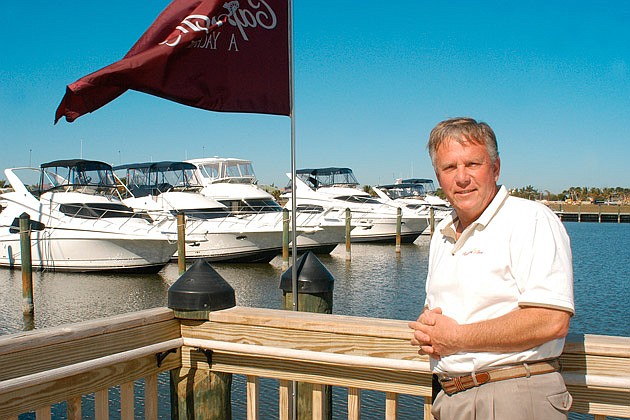- November 26, 2024
-
-
Loading

Loading

Ask Will Stout what opportunities lay ahead for real estate investors and a brief smile flashes across his otherwise poker-straight face.
Press him on the details and you'll get this answer: “I can't tell you that. It's our business plan.”
But Stout clearly is itching for another real estate cycle to begin, or what he prefers to call a “campaign.” He finished his last condo tower in Cape Harbour in 2007, a signature Cape Coral waterfront community at the mouth of the Caloosahatchee River.
Now he's tiptoeing back into development with a project called Funky Fish Houses, 19 unique waterfront homes as a test for what could become a Key West-style village at Cape Harbour.
What Stout won't be building is another condo tower. “I don't think we'll see a market for that for 10 years,” Stout says.
New and different residential homes will be on the menu for this next cycle. McMansions with large dining rooms overlooking expensive golf courses will be out, replaced by smaller homes with canoes, barbecue grills and walking paths.
Manatee County homebuilder Pat Neal, one of the most prolific developers on the Gulf Coast, is undertaking a similar strategy with new projects in Bradenton. As a result, Neal Communities sales have been up this year, although revenues are off from the peak of the boom.
Stout and Neal are spreading their risk by betting that wealthy buyers will be looking for small homes they can visit occasionally and rent most of the year. Instead of one large vacation home, they may instead opt for three or four small homes Stout calls “rocket pockets.”
Whatever Stout plans to do, it'll be worth watching. “He has the vision,” says Fred Pezeshkan, chief executive officer of Kraft Construction in Naples, which has built millions of dollars worth of buildings for Stout's company,
Realmark Development. “You must have the foresight and see beyond what other people do,” Pezeshkan says. “Part of it comes from experience and part of it comes with gut.”
Stout certainly has plenty of both. “There will be more opportunities in the next five years than anytime in the last 55 years,” he says.
Demand is key
Cape Coral has been hit particularly hard by the real estate downturn after having been one the fastest-growing cities in the nation during the boom. In the bust that ensued, the city's residential woes helped propel Lee County to the top ranks of the foreclosure charts nationwide.
The 63-year-old Stout has seen his share of downturns. He started out as a young executive with C&S Bank in Georgia, working to clean up distressed real estate assets in the 1970s recession and later running one of the largest residential brokerage firms in the Southeast. “It's like seeing a thunderstorm,” says Stout. “We didn't recognize [this one] as early as I thought.”
Fortunately, Stout was finishing the second of two condo towers at Cape Harbour when the downturn really took hold in 2007. “This is far worse than any I've been through and I've been in business since 1969,” Stout says.
Despite the record number of foreclosures, housing supply is not the issue now. “The inventory is being gobbled up,” Stout says. “That problem, I think, is gone.” Existing single-family home sales in Lee County rose 137% in June over the same month a year ago and the inventory of homes has fallen by 41% over the same period, according to the Realtor Association of Greater Fort Myers and the Beach Inc.
“The issue right now is clearly demand,” Stout says. “Everybody's afraid.”
To recover, the job market will have to improve. Unemployment is relatively high, both locally (13%) and nationally (9.4%). Stout says the true unemployment numbers could be double those figures because the government doesn't count people whose benefits have expired, for example.
What's more, Southwest Florida's economy is largely dependent on migration from the Midwest, where the manufacturing downturn has been especially brutal. “When the market is off in Chicago, it's off in Southwest Florida,” Stout says.
Once the market recovers, development won't look the same. “People will have to have affordable housing,” Stout says. The market for homes will remain under $200,000, he says, down from the $500,000 range during the boom, and developers will have to adjust accordingly.
We're close
Stout is widely considered the first large-scale developer to recognize the potential of Cape Coral's south side before the most recent boom, giving him an enviable track record. In 2000, he assembled 200 acres that would become Cape Harbour, turning a partially developed area with once-disgruntled residents into a successful waterfront community with a thriving marina, shops and restaurants. (Stout declines to discuss any financial details.)
In 1998, just before acquiring the Cape Harbour land, Stout sold his Atlanta residential brokerage company, Buckhead Brokers, to Coldwell Banker. He then ran it for a year before retiring. “I enjoyed retirement for 61 days,” Stout chuckles. At the time, Buckhead Brokers had become the largest residential brokerage in the region.
Stout used the undisclosed proceeds from the sale of Buckhead Brokers to help finance the acquisition of Cape Harbour and then Burnt Store Marina, where he had a vacation home among the 1,000 boat slips.
Stout finished the second of two condo towers at Cape Harbour in 2007, just as the boom was about to go bust. Many of the units had been sold to individuals instead of speculators, which helped Realmark avoid the busted deals that plagued rivals.
Now, Stout sees what he calls “opportunities of a lifetime.” Developers and lenders are selling land acquired during the boom for pennies on the dollar. “We've reached that time or we're close to that time,” he says.
Stout won't reveal where he's looking or how he's planning to finance any land buys. For now, the biggest challenge is to figure out when demand will return because the holding period could be long.